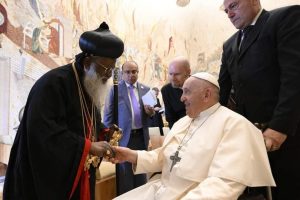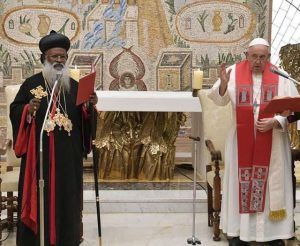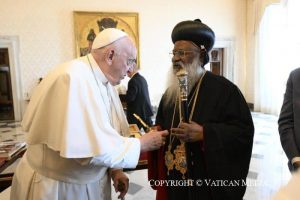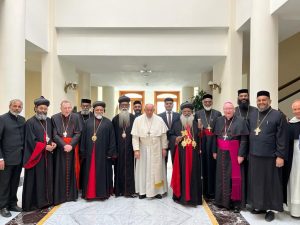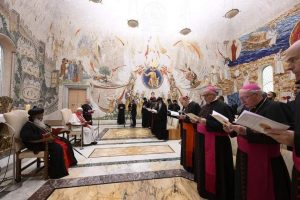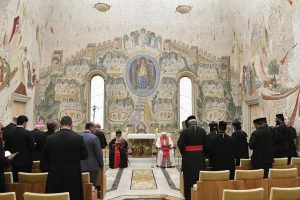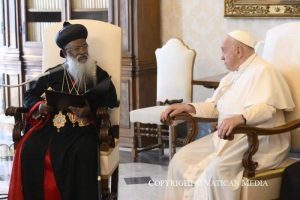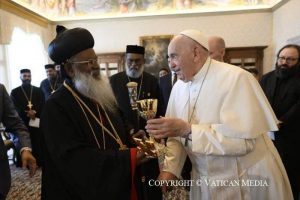Speech of His Holiness Baselius Marthoma Mathews III on the Occasion of his meeting with Pope Francis on 11 September 2023
Your Holiness, Your Eminences, Officials of the Dicastery for Promoting Christian Unity and dear Fathers and brothers:
As we gather together in awe of God’s boundless mercy and providence, we are reminded of the words of the Apostle Paul in Ephesians 4:4-6: ‘There is one body and one Spirit, just as you were called to the one hope of your calling, one Lord, one faith, one baptism; one God and Father of all, who is above all and through all and in all.’ Holy Father, as we come together, we are humbled by the guiding hand of our Heavenly Father, which has united us in this sacred encounter. This meeting marks a continuation of the longstanding dialogue between our two Churches, a journey that has been marked by shared values, mutual respect, and the unyielding commitment to Christian unity.
Your Holiness has eloquently expressed in your encyclical ‘Fratelli Tutti,’ saying, ‘We were not created for an isolated existence, but for mutual love; we were created to live together, loving one another as brothers and sisters.’ As we gather here, we find inspiration in what Your Holiness has pronounced for us, aiming to strengthen our fraternal bonds between us. This sentiment resonates deeply with the shared path we have walked, emphasizing the importance of unity and compassion in a world that often seeks division.
When we reflect on the principles outlined in the encyclical, in the context of our meeting, we are reminded that our journey toward greater harmony and understanding is not only a dialogue between leaders but a testament to the commitment of our congregations to promote peace, justice, and the dignity of every human person. I believe that our coming together today is an embodiment of this commitment, as we strive to weave the threads of unity and fraternity into the fabric of our shared faith.
As we assemble in this hallowed space, we cannot help but look back with thanksgiving on the series of meetings that have transpired between the heads of our Churches, spanning back to that momentous year of 1964. These encounters have not only strengthened our ecclesiastical bonds but have also served as a beacon of hope for Christians around the world, demonstrating that unity is not only achievable but also essential in these challenging times.
I must extend my heartfelt appreciation to the Dicastery for Promoting Christian Unity, an institution that has tirelessly worked to foster bilateral relations between our Churches. Their dedicated efforts have borne fruit in the form of bilateral agreements that reflect our shared commitment to the Christian faith. These agreements encompass the sharing of the sacred places, as well as the sacraments of confession and anointing of the sick in extraordinary situations. I consider these agreements, dear brethren, as not mere legal documents, but manifestations of our shared devotion to Christ and His message of love.
The ongoing dialogues between our two Churches stand as a testament to our resolve in strengthening our relations even further. It is through these dialogues that we find the fertile ground for fostering understanding, empathy, and a shared pursuit of spreading the Gospel’s message. We are happy to highlight the active participation of the Malankara Orthodox Church in the dialogue between the Catholic and Oriental Orthodox families of Churches. We extend our heartfelt gratitude to Your Holiness and the Dicastery for Promoting Christian Unity for their unwavering commitment to these dialogues, which have enabled us to stand united in our witness to Christ’s love, even in a world that often seems fractured.
In the face of a world that sometimes prioritizes fleeting freedoms over eternal truths, we, as leaders of traditional Christian Churches, must raise our collective voice in the defense of moral values and Gospel principles. It is our duty to guide the present generation towards a life rooted in the teachings of Christ, showing them that true liberty lies in the embrace of these timeless values.
On this occasion I would like to briefly reflect upon the forthcoming General Assembly of the Synod of Bishops in October 2023, bearing the profound theme, “Synodal Church: Communion, Participation, and Mission.” In an era where unity and collaboration are indispensable, the theme of this Synod resonates profoundly with our beliefs and aspirations. For our Church, synodality is not merely a contemporary concept but is embedded in the very fabric of our ecclesiastical identity. We affirm with unwavering conviction that the synodal dimensions are not only deeply rooted in sacred scripture but also doctrinally pivotal for the Church’s growth and spiritual well-being. Through the ages, we have seen how the Holy Spirit guides and empowers the Church when its members come together in true communion and participation, as exemplified by the first Apostolic Council in Jerusalem. We express our heartfelt prayers for the successful accomplishment of the Synod.
I take this moment to extend a heartfelt invitation to Your Holiness to pay a visit in witnessing the rich traditions of St. Thomas’ land. Our doors are open, and we eagerly anticipate the day when we can welcome Your Holiness to our sacred land, steeped in the legacy of our patron apostle.
Furthermore, I am pleased to acknowledge the Dicastery’s initiative in organizing group pilgrimages of young monks from the Oriental Orthodox Churches to the Holy See. In this spirit of exchange and learning, I express our desire to host young monks, nuns, and academicians from the Catholic Church to our Malankara Orthodox Church. We wish for them to immerse themselves in the vibrant tapestry of our St. Thomas Apostolic traditions, thereby strengthening the bonds of fellowship and knowledge.
As we conclude, let us draw inspiration from the words of the Apostle Paul, who reminds us in Colossians 3:14: “And above all clothe yourselves with love, which binds everything together in perfect harmony.” With these words echoing in our hearts, let us continue on this journey of unity, strengthened by our shared faith and commitment to Christ’s message of love and salvation.
May the Almighty bless this meeting, guide our future interactions, and empower us to witness His love together in this fractured world.
With hearts full of prayerful wishes and boundless gratitude, we look forward to the path ahead.
May the love, grace and indwelling of the blessed Holy Trinity be with us now and always, forever. Amen.
Pope Francis’ response to the speech of HH Baselius Marthoma Mathews III
Your Holiness,
I thank you for your kind words and for your visit to the City of the Apostles Peter and Paul, where you once lived and studied and where you now come as Catholicos of the venerable Malankara Orthodox Syrian Church. May I say, Your Holiness, that here you are at home, as a beloved and long-awaited Brother.
Together with you, I would first like to give thanks to the Lord for the bonds we have forged in recent decades. The rapprochement of our Churches, after centuries of separation, began with the Second Vatican Council, to which the Malankara Orthodox Syrian Church sent some observers. At that time, Saint Paul VI met the Catholicos Baselios Augen I in Bombay in 1964. Your arrival now coincides with the fortieth anniversary of the first visit to Rome of a Catholicos of your beloved Church, made in 1983 by His Holiness Baselios Marthoma Mathews I, whom Saint John Paul II visited three years later in the Cathedral of Mar Elia in Kottayam. This year also marks the tenth anniversary of my fraternal embrace with your immediate Predecessor, His Holiness Baselios Marthoma Paulose II, of blessed memory, whom I had the joy of receiving at the beginning of my Pontificate, in September 2013.
Today, in welcoming Your Holiness and the members of your distinguished delegation, I fraternally greet the bishops, clergy and faithful of the Malankara Orthodox Syrian Church, the origins of which go back to the preaching of the Apostle Thomas, who, in the presence of the Risen One, exclaimed: “My Lord and my God!” (Jn 20:28). In prayer and awe, this profession, which proclaims the saving lordship and divinity of Christ, undergirds our common faith. It is this same faith that I hope we will celebrate together on the occasion of the 1,700th anniversary of the first Ecumenical Council, that of Nicaea. I would like for all of us to celebrate it together.
The faith of Saint Thomas was inseparable from his experience of the wounds of the Body of Christ (cf. Jn 20:27). The divisions that have occurred throughout history between us Christians have been painful wounds inflicted on the Body of Christ that is the Church. We ourselves continue to witness their effects. Yet if we touch these wounds together; if, like the Apostle, we proclaim together that Jesus is our Lord and our God; and if, with a humble heart, we entrust ourselves to his amazing grace, we can hasten the much-anticipated day when, with his help, we will celebrate the Paschal Mystery at the same altar. May this day arrive soon!
In the meantime, dear Brother, let us advance together in the prayer that purifies us, in the charity that unites us, and in the dialogue that brings us closer to one another. I think in a special way of the establishment of the Joint International Commission for dialogue between our Churches, which led to an historic Christological agreement, published on Pentecost 1990. This was the Joint Declaration affirming that the content of our faith in the mystery of the Incarnate Word is the same, even though differences in terminology and emphasis have arisen in its formulation throughout history. The Declaration admirably states that, “these differences are such as can coexist in the same communion and therefore need not and should not divide us, especially when we proclaim Christ to our brothers and sisters around the world in terms that they can more easily understand”. Proclaiming Christ unites rather than divides; the shared proclamation of our Lord evangelizes the ecumenical journey itself.
Following the Joint Declaration, the Commission has met in Kerala almost every year and has borne fruit, fostering pastoral cooperation for the spiritual benefit of God’s People. I recall with gratitude especially the 2010 agreements on the common use of places of worship and cemeteries, and on the possibility that, in certain circumstances, the faithful of either Church may receive the anointing of the sick. These are wonderful agreements. I bless God for the work of this Commission, focused above all on pastoral life, since pastoral ecumenism is the natural way to full unity. As I had occasion to say to the Joint International Commission for Theological Dialogue between the Catholic Church and the Oriental Orthodox Churches, of which your Church has been a member since its inception in 2003, “ecumenism always has a pastoral character”. It is by moving forward fraternally in the preaching of the Gospel and the concrete care of the faithful that we acknowledge ourselves to be a single pilgrim flock of Christ. In this regard, it is my hope that pastoral agreements between our Churches, which share the same apostolic heritage, may spread and develop, especially in areas where the faithful are in a minority or in diaspora. I am also gratified by your active participation in the study visits for young priests and monks organized annually by the Dicastery for the Promotion of Christian Unity, visits that contribute to better understanding among pastors. This is very important.
On our journey towards full unity, another important path is that of synodality, which you referred to in your address. Ten years ago, in Rome, your Predecessor declared: “The participation of representatives of the Malankara Orthodox Church in the conciliar process of the Catholic Church since the Second Vatican Council, has been of fundamental importance for the growth of mutual understanding”. I am pleased that a fraternal delegate from your Church will participate in the next session of the Assembly of the Synod of Bishops. I am convinced that we can learn much from the age-old synodal experience of your Church. In a certain sense, the ecumenical movement is contributing to the ongoing synodal process of the Catholic Church, and it is my hope that the synodal process can, in turn, contribute to the ecumenical movement. Synodality and ecumenism are in fact two paths that proceed together, united by a common goal, that of communion, which means a more effective witness by Christians “so that the world may believe” (Jn 17:21). Let us not forget – and I say this to fellow Catholics – that the protagonist of the Synod is the Holy Spirit, not ourselves.
It was precisely for this that the Lord prayed before Easter, and so it is proper that today’s meeting will continue with prayer. May Saint Thomas the Apostle intercede for our journey of unity and witness. His relics are kept in the Archdiocese of Lanciano-Ortona, represented here by Archbishop Emidio Cipollone. Thank you for your presence. When the Lord showed him his wounds, Saint Thomas passed from disbelief to belief by what he saw. May our shared contemplation of the crucified and risen Lord lead to the complete healing of our past wounds, so that, before our eyes, transcending all distance and misunderstanding, he may appear, “our Lord and our God” (cf. Jn 20:28), who calls us to recognize and adore him at a single Eucharistic altar. Let us pray that this happens soon. Thank you!


